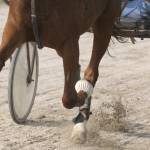Bone Chips in Horses

When horses exercise, the bones and cartilage in their joints are subjected to repeated concussive forces. In a mature horse with correct conformation, most of the concussion can be absorbed without damage. If there are conformation problems that increase the force applied to joints, or if the exercise is excessive, small pieces of cartilage or bone can separate from the joint surface. Young horses suffering from bone diseases such as osteochondritis dissecans (OCD) are also subject to developing loose or detached bits of tissue in the joint. These chips, which vary in size, may be harmless, but they can cause serious pain and lameness if they lodge in a position that impacts movement. As the horse exercises, friction may cause the flaps or chips to shed bits of tissue, increasing irritation that can lead to arthritis.
Many factors influence whether or not a particular horse will develop bone chips. These may include genetics, rapid growth, mineral imbalances, nutritional management, mechanical stress, trauma, overfeeding, endocrine problems, and accidental injury. It is estimated that about 15% of horse have some type of bone abnormality that might lead to the formation of bone chips. Some problems with bone development can be detected when yearling horses are radiographed before going to a sale.
If bone chips are found in young horses, a veterinarian can often decide whether the chip is likely to cause a problem or whether no treatment is needed because of the chip’s location. Where inflammation is present but the horse does not show lameness, the veterinarian may choose to treat the horse by injecting hyaluronic acid or an anti-inflammatory substance into the joint. If the horse experiences lameness, treatment often involves arthroscopic surgery in which the chips are removed through tiny incisions. Surgery is followed by a period of rest that allows inflammation to dissipate.
In Thoroughbred racehorses, chips are most commonly found in fetlock and knee joints, though any joint can be affected. In general, horses with fetlock chips have a better prognosis after surgery horses with knee chips.








